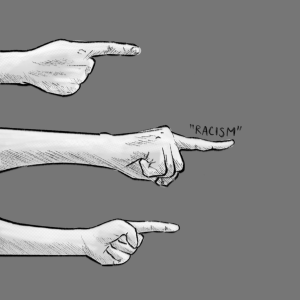US Recognizes Armenian Genocide for First Time, Puts Alliance With Turkey at Risk
May 30, 2021
On April 24th, President Joe Biden declared that the United States would recognize the systematic murders of Armenian people at the hands of the Ottoman Empire as an official genocide. Armenians all around the world celebrated this announcement, with activist Taleen Nazarian remarking “It’s still surreal that the day we’ve been fighting for finally came.” The Turkish government—which succeeded the Ottoman Empire after its collapse in 1922—was less sympathetic toward the news, with the Turkish foreign ministry releasing a statement that accused Biden of opening “a deep wound that undermines our mutual trust and friendship [with the United States],” and called on him “to correct this grave mistake.” Turkey has indeed been a strong American ally for decades, especially due to its geographic proximity to countries such as Syria, Iraq, and Afghanistan, with whom the United States remains in conflict with to this day, as part of the War on Terror. During this time, however, the US has been criticized for its willingness to ignore Turkey’s terrorist activities. Biden’s announcement could mark an end to the American tendency to look the other way when its partner in the Middle East commits unethical crimes.
Although the Armenian Genocide transpired more than a century ago at the onset of World War I, its lasting impact on the world remains heavy today. And if history repeats itself, as it often does, this event can be used as a case example to understand how a country is led down the path of scapegoating and eventual tragedy, as it did in the Middle East in the 1910s.
By the turn of the 20th century, a once-thriving Ottoman Empire began to face rapid decline. Across the empire’s vast territory, which spanned three continents and had once reached modern-day Algeria, Yemen, and Romania, independence movements began to demand more freedom and institutional reform from authorities. Most popular among these movements was the Young Turks Party, led by Turkish nationalist Mehmed Talaat (later known as Talaat Pasha), whose charismatic personality gained him increasingly powerful positions in the Ottoman government. After a 1913 coup, as one of the Three Pashas, Talaat seized absolute power, and by the time of the Ottoman’s entry into World War I in 1914, he had become the empire’s de facto leader.
Rather than attempting to unite the country’s many different factions, Talaat immediately took to blaming specific ethnic groups for the dissolution of the empire. His main target was the Armenian Christian population, a group native to small villages in eastern provinces of the empire–just south of Russia, bordering modern-day Iran–who were historically treated as second-class citizens under Ottoman rule. They had begun to call for more representation and protection from those in power, after being victimized by forced labor, robberies, and overtaxation for many years. Talaat instead ordered compulsory deportations and internments in concentration camps. Armenian intellectuals, political leaders, and villagers were subjected to systematic hard labor, death marches, and widespread sexual assault. Before World War I, roughly 1.5-2 million Armenians had been living in the Ottoman Empire. Just six years later, that number was cut down to less than 400,000. For Armenians living both domestically and abroad, the genocide became a devastating, yet essential part of their history and identity.
Although the details of the Armenian Genocide were well-documented by Western diplomats and journalists, the event has been conspicuously absent or misinterpreted in most education curricula and political discussions. Despite the large Armenian population in the United States, the historical oppression that they endured is obscure information for most Americans.
The genocide remains important to this day, as a story of what can happen when unbridled nationalism and ethnic supremacism have a platform to take control. Turkish nationalism remains an existential threat in the Middle East, and since World War I, the United States has found it in its best interest to stay quiet about that danger. In 2007, President George W. Bush’s administration rejected a Congressional resolution condemning the genocide, with Bush stating that “This resolution is not the right response to these historic mass killings and its passage would do great harm to relations with a key ally [Turkey] in NATO, and to the war on terror.” Additionally, although presidents Reagan, H.W Bush, and Obama all expressed promises to recognize the Armenian Genocide in some formal way, they all failed to do so. President Trump also embraced a close relationship with Turkish President Recep Tayyip Erdoğan, whose increasingly authoritarian tendencies, political purges, and imperial evils have evoked the despotism which haunted the region a hundred years earlier. Thus, President Biden’s recognition of the genocide—more than a century after its occurrence—is a shock, and leads many to hope for more humanitarian improvements to develop in US relations with Turkey.
The question now becomes: what next? Although Biden’s recognition of the genocide nominally shakes relations with a country whom the US has historically failed to hold accountable, it remains unclear what his policy on Turkey will look like from here. For now, US foreign policy remains relatively unconcerned with the moral crimes of its allies, and it will take a fair amount of pressure on the Pentagon and State Department to reverse this long-standing attitude. “I don’t think [the recognition is] representative of a larger shift in American foreign policy,” says Mr. Benji Cohen, a history teacher at CRLS. “I would say it’s fifty-percent opportunism, in that it’s good to feign a more progressive-leaning foreign policy, and fifty-percent an opportunity to turn the knife on Turkey.” If Biden’s announcement means that America could finally begin to rethink its alignment with Turkey or other autocratically oppressive countries, it may mark a significant turning point. The chance to make a difference for the better is in front of Biden now, but this could just as easily become another ceremonial gesture of morality that results in little fundamental change.










